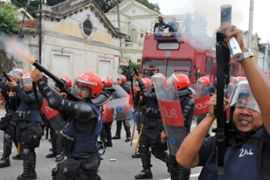Scores held after Malaysia protest
More than 60 demonstrators against security law likely to be charged.

Omar denied that police action had been heavy handed, saying the authorities had used the “minimum amount of force”.
“It was a standard procedure … to disperse this crowd in Kuala Lumpur,” he told Al Jazeera.
Government authorities had earlier warned that they would not grant a permit for the protest, saying it could undermine public peace.
Hundreds arrested
Witnesses estimated that as many as 20,000 demonstrators took to the streets for the protest against Malaysia’s Internal Security Act (ISA) on Saturday.
The protesters, some wearing opposition T-shirts and headbands, massed at Kuala Lumpur’s main mosque, a shopping mall and a train station.
Police repeatedly fired volleys of tear gas and water laced with stinging chemicals to disperse the crowds after they began marching toward the national palace.
Organisers said they intended to present a 10-point memo to the king, including demands for the abolition of ISA and the closure of a camp in northern Perak state where detainees are held.
Over 580 people were arrested, according to the police, but most were later released.
If those remaining in custody are charged with illegal assembly, they could face up to a year in prison and a fine if convicted.
‘Brutal’ crackdown
The clampdown on the protest could damage support for Najib Razak, the prime minster, who took power in April and has been battling efforts by opposition parties to portray him as a leader who disregards public opinion on issues such as human rights and freedom of expression.
Anwar Ibrahim, the opposition leader, called the police action “brutal”.
“This clearly shows Najib’s intolerance to any dissent,” he said.
Human rights activists have held numerous smaller protests over the years against the security act, but Saturday’s event received a boost after opposition parties urged their supporters to come out in force.
The ISA was originally instituted under Britain’s colonial rule of Malaysia.
Most of those being held under the act have been accused of links to Islamic militancy and document forgery, but human rights groups say it has also been used to jail government critics.